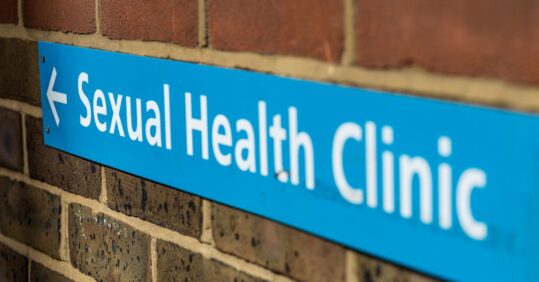More funding ‘desperately’ needed in sexual health services as demand soars

Sexual health services ‘desperately’ need more funding to ensure timely access to care for those who need it and to prevent sexually transmitted infections (STIs) going untreated, a leading nurse has said, as latest data shows a significant rise in demand.
New diagnoses of gonorrhoea in 2022 were at their highest levels since records began in 1918, new figures published by the UK Health Security Agency this week showed.
In 2022, 82,592 new cases of gonorrhoea were diagnosed in England – 50% more than in 2021 and 16% more than pre-pandemic levels.
With gonorrhoea becoming increasingly resistant to antibiotics, risking it becoming untreatable in the future, the UKHSA emphasised the ‘vital’ need for early testing and diagnosis to prevent the STI being passed on. Left untreated, gonorrhoea can cause infertility and pelvic inflammatory disease.
Meanwhile, infectious syphilis diagnoses were also at a record high, with 8,692 new cases diagnosed in England in 2022 – the largest annual number since 1948. This was also 15% more than in 2021 and 8% higher than pre-pandemic levels. Syphilis can be treated with antibiotics but can cause serious, irreversible and potentially life-threatening damage to the brain, heart or nervous system if left untreated.
The UKHSA said that infection rates were particularly high among young people aged 15 to 24, with over 400 diagnoses of STIs made each day among this group.
Related Article: ‘Patients not prisoners’: Palliative care nursing behind bars
While there had been an increase in diagnostic testing – with 13% more sexual health screens performed in 2022 than in 2021 – the UKHSA said that the scale of the increase in diagnoses strongly suggests that there is more transmission of STIs within the population, in addition to increased diagnoses due to increased testing.
‘Funding cuts and recruitment pressures’ amid demand increase
Sexual health specialist nurse and co-chair of the STI Foundation Jodie Crossman echoed the ‘huge rise in demand’ seen among services since 2019.
She highlighted the work done in recent years to ‘improve access and testing opportunities, including innovative digital online services’ and told Nursing in Practice that sexual health nurses remained ‘incredibly dedicated, skilled and hardworking’.
But she stressed that increased demand had come against a backdrop of ‘funding cuts and recruitment pressures’.
‘Focus needs to be placed on equity of access across the UK, so that everyone has access to testing, treatment and measures to prevent the onward transmission of STIs,’ said Ms Crossman, who was the inaugural chair of the British Association for Sexual Health and HIV (BASHH) Sexual Health Adviser and Nurses specialist interest group.
‘We desperately need the funding to be able to offer timely access to screening and care to everyone who needs it, and to prevent the negative consequences of untreated STIs.’
Meanwhile, Belinda Loftus, a registered nurse speaking on behalf of BASHH, said sexual health services ‘have had to diversify roles’, upskill practitioners and introduce new roles amid increased demand.
Among the key challenges among services were new emerging infections and antibiotic resistances, as well as national workforce issues which Ms Loftus said was made ‘more complex by the requirement for nurses in sexual health to have additional specialist training’.
Related Article: NHSE confirms dates and eligibility for autumn Covid and flu jabs
She added: ‘Capacity versus demand is and always has been a challenge, but this speciality remains an interesting and dynamic place to work as a nurse, we welcome any new recruits who are interested.’
Sexual health services at risk of breaking point
David Fothergill, chairman of the Local Government Association’s Community Wellbeing Board warned that the rising demand for sexual health services as well as real-term funding cuts were putting local council-commissioned sexual health services at risk of breaking point.
He said: ‘It is encouraging to see more people visiting their local sexual health clinic, which is a testament to the work of councils with hard-to-reach communities in their areas, as well as the new cutting-edge treatments on offer.
‘However, this is becoming increasingly unsustainable without a long-term increase in councils’ public health grant, which goes towards funding vital sexual health services.’
He added: ‘The government should ensure sexual and reproductive health funding is increased to levels which matches the increases local services have seen in demand. Investment in early intervention helps to save costs to the health service and prevents problems developing further down the line.’
Related Article: ‘Concerning acceleration’ in drug-resistant gonorrhoea ahead of vaccine programme
A Department of Health and Social Care spokesperson said: ‘We are providing more than £3.5 billion through our Public Health Grant, so local authorities across England can improve diagnosis of sexually transmitted infections and provide early treatment, helping to avoid transmission and any long-term health problems.
‘We’re also reducing the impact of HIV through our National HIV Action Plan and raising awareness of ways to prevent the spread of sexually transmitted infections among the most affected communities with our National HIV Prevention Programme.’
A version of this article was first published by our sister title The Pharmacist

See how our symptom tool can help you make better sense of patient presentations
Click here to search a symptom




